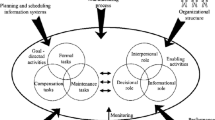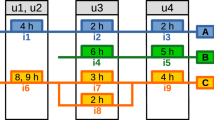Abstract
We address the problem of building an interruptible real-time system using non-interruptible components. Some artificial intelligence techniques offer a tradeoff between computation time and quality of results, but their run-time must be determined when they are activated. These techniques, called contract algorithms, introduce a complex scheduling problem when there is uncertainty about the amount of time available for problem-solving. We show how to optimally sequence contract algorithms to create the best possible interruptible system with or without stochastic information about the deadline. These results extend the foundation of real-time problem-solving and provide useful guidance for embedding contract algorithms in applications.
Similar content being viewed by others
References
R. Baeza-Yates, J. Culberson and G. Rawlins, Searching in the plane, Information and Computation 106 (1993) 234–252.
D.S. Bernstein, T.J. Perkins, S. Zilberstein and L. Finkelstein, Scheduling contract algorithms on multiple processors, in: AAAI Fall Symposium on Using Uncertainty Within Computation (2001) pp. 10–14.
M. Boddy and T. Dean, Deliberation scheduling for problem solving in time-constrained environments, Artificial Intelligence 67(2) (1994) 245–286.
T. Dean and M. Boddy, An analysis of time-dependent planning, in: Seventh National Conference on Artificial Intelligence (1988) pp. 49–54.
J.-M. Gallone and F. Charpillet, Real-time scheduling with Neurosched, in: 13th International Conference on Tools with Artificial Intelligence (1997) pp. 478–479.
A. Garvey and V. Lesser, Design-to-time real-time scheduling, IEEE Transactions on Systems, Man, and Cybernetics 23(6) (1993) 1491–1502.
D. Einav and M.R. Fehling, Computationally-optimal real-resource strategies, IEEE International Conference on Systems, Man and Cybernetics (1990) 581–586.
E.A. Hansen and S. Zilberstein, Monitoring the progress of anytime problem-solving, in: Thirteenth National Conference on Artificial Intelligence (1996) pp. 1229–1234.
E.A. Hansen and S. Zilberstein, Monitoring and control of anytime algorithms: A dynamic programming approach, Artificial Intelligence 126(1–2) (2001) 139–157.
E. Horvitz, Reasoning about beliefs and actions under computational resource constraints, in: Workshop on Uncertainty in Artificial Intelligence, Seattle,WA (1987).
E. Horvitz, Reasoning under varying and uncertain resource constraints, in: Seventh National Conference on Artificial Intelligence (1988) pp. 111–116.
E. Horvitz, Computation and action under bounded resources, Ph.D. dissertation, Stanford University, California (1990).
E. Horvitz, Models of continual computation, in: Fourteenth National Conference on Artificial Intelligence (1997) pp. 286–293.
E. Horvitz and S. Zilberstein (eds.), Fall symposium on flexible computation in intelligent systems, Technical Report FS-96-06 (AAAI, Menlo Park, CA, 1996).
A. Pos, Time-constrained model-based diagnosis, Master Thesis, Department of Computer Science, University of Twente, The Netherlands (1993).
S.J. Russell, D. Subramanian and R. Parr, Provably bounded optimal agents, in: Thirteenth International Joint Conference on Artificial Intelligence (1993) pp. 338–344.
S.J. Russell and E.H. Wefald, Principles of metareasoning, Artificial Intelligence 49 (1991) 361–395.
S.J. Russell and S. Zilberstein, Composing real-time systems, in: Twelfth International Joint Conference on Artificial Intelligence (1991) pp. 212–217.
T.W. Sandholm and V.R. Lesser, Utility-based termination of anytime algorithms, in: ECAI Workshop on Decision Theory for DAI Applications (1994) pp. 88–99.
S. Zilberstein, Optimizing decision quality with contract algorithms, in: Fourteenth International Joint Conference on Artificial Intelligence (1995) pp. 1576–1582.
S. Zilberstein and S.J. Russell, Optimal composition of real-time systems, Artificial Intelligence 82(1–2) (1996) 181–213.
S. Zilberstein and A.-I. Mouaddib, Reactive control of dynamic progressive processing, in: Sixteenth International Joint Conference on Artificial Intelligence (1999) pp. 1268–1273.
S. Zilberstein, A.-I. Mouaddib and A. Arnt, Dynamic scheduling of progressive processing plans, in: ECAI 2000 Workshop on Planning, Scheduling and Design (2000) pp. 139–145.
Author information
Authors and Affiliations
Rights and permissions
About this article
Cite this article
Zilberstein, S., Charpillet, F. & Chassaing, P. Optimal Sequencing of Contract Algorithms. Annals of Mathematics and Artificial Intelligence 39, 1–18 (2003). https://doi.org/10.1023/A:1024412831598
Issue Date:
DOI: https://doi.org/10.1023/A:1024412831598




